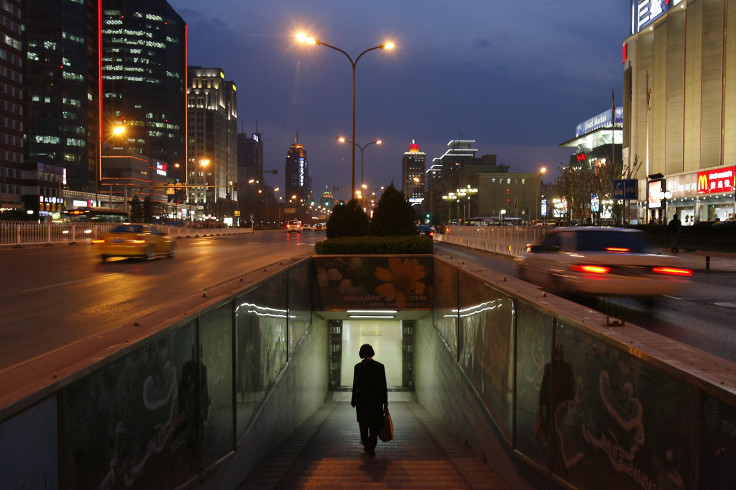China Pledges To Cut Red Tape, Open Financial Sector - And Spend $40B On Railways - To Boost Slowing Economy

SHANGHAI -- Cutting red tape, easing market access, reforming state enterprises and taxation, liberalizing interest rates, promoting public-private partnership, and encouraging the convertibility of the yuan. It’s a long shopping list -- but that’s what the Chinese government says is necessary to make the world’s second-largest economy more competitive.
With China’s economy growing at 7 percent in the first quarter of 2015, its slowest rate for seven years, and officials acknowledging it could be hard to maintain even this growth rate in the coming months, China’s cabinet, the State Council, on Monday issued a detailed list of reforms it said would “add new impetus to the country’s development.”
Analysts said most of the measures were not completely new -- but the statement adds to a sense that the government wishes to be seen as responsive and decisive on key economic issues.
Among other measures, the State Council stressed that more steps would be taken to open up China’s financial sector and “build a financial mechanism that better benefits the real economy,” according to the Xinhua news agency.
One commonly stated concern is the difficulty for small enterprises to obtain loans from big state banks -- and the State Council’s proposal to “speed up the development of private banks and small financial institutions” may be designed to tackle this problem.
The government also pledged fresh tax reforms -- including “adjusting” personal income tax, which some analysts say needs to be cut in order to stimulate domestic consumption.
It vowed to make the Chinese yuan “more flexible against other currencies” -- and to encourage its use in cross-border settlements. It also said it would introduce trial reforms linking the Shenzhen and Hong Kong stock exchanges; a previous pilot, linking Hong Kong with China’s other main exchange, in Shanghai, late last year, has contributed to a massive boom on both cities’ exchanges over the past few months (though some observers have warned this could divert money from the ‘real economy’).
The State Council also promised further reforms in pricing mechanisms for medicine and gas supplies, and said it would encourage public-private partnerships -- in order to bring more private funds into “infrastructure construction and public enterprises.” Analysts say the Chinese government, while anxious to boost the economy, is not keen to resort to the kind of major government-funded infrastructure spending that it used to pump-prime the economy following the global financial crisis of 2008.
However, in an echo of the massive railway construction the government rolled out during that period, China’s top planning authority also announced that it had approved construction of another 1,000 kilometers (620 miles) of railways, including four more high-speed lines, to “help stabilize economic growth.” The National Development and Reform Commission said the projects would cost around 250 billion yuan ($40.3 billion), according to Xinhua, though it did not specify whether they would be funded through public-private partnerships.
Another key plan to boost the economy this year is to promote investment overseas: in the first quarter of the year, China’s non-financial investment abroad was $25.8 billion, a rise of more than a quarter from a year earlier. In another document released at the weekend, the State Council announced new guidelines for “capacity cooperation”: It urged Chinese manufacturing businesses with “under-utilized industrial capacity” -- resulting from a recent slowdown in export demand -- to shift this capacity abroad, either by physically moving production lines, or through joint-venture investments overseas.
The State Council said this would help to tackle the problem where “too many similar factories are churning out fundamental products including iron and steel, cement and plate glass.” It listed transportation, telecommunications and textiles as other areas for such transfers -- and promised tax breaks and cheaper loans to encourage companies to make such a shift.
The official China Daily also said that Premier Li Keqiang’s visit to Latin America this week (he arrived in Brazil on Monday) was “part of a broader campaign” to promote such capacity cooperation. During his visit, Li is expected to call for progress on a proposed -- though controversial -- project for a Chinese-built railway through the Amazon rainforest, linking the Pacific coast of Peru to Brazil’s Atlantic coast.
And though the government has talked of reforming China’s bureaucracy for many years, some foreign business people who have met with government officials recently have said that they believe the authorities are now more serious about trying to cut red tape, and allowing market mechanisms to wield greater influence. Li was recently quoted as saying that some bureaucracy in China was so complex that it was “laughable,” and the cabinet has announced several measures aimed at streamlining the policy approval process, and making it easier for companies to do business.
Chinese media have this week publicized the case of a hotel company manager who recently posted a letter online, complaining about local officials imposing random charges on businesses. As a result, he was reportedly contacted by the State Council, and asked to write a letter directly to Li explaining his views. Last week he was also invited to an official seminar on transparency in local government. The China Daily quoted a State Council official as saying that “the government will invite entrepreneurs and public representatives to join a comprehensive review of public administration” in future.
And while the authorities continue to take a tough line on social activism and political dissent, some observers believe that Li’s recent pledge to reform the relationship between the government and the market is a serious statement of intent -- though some observers have noted that implementing sensitive reforms that affect the vested interests of the bureaucracy, and the government’s role in the economy, remains a huge challenge.
© Copyright IBTimes 2024. All rights reserved.












